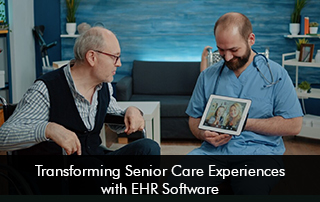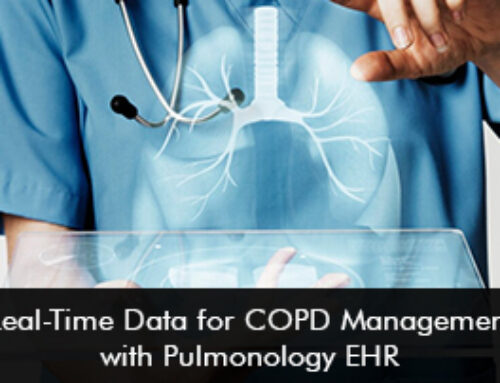The senior care industry faces unique challenges, from managing chronic illnesses to ensuring continuity of care and improving quality of life. In this context, Electronic Health Record (EHR) software has emerged as a critical tool for transforming senior care experiences. By streamlining documentation, enhancing communication, and enabling personalized care, EHR systems are reshaping how healthcare providers meet the needs of elderly patients. In today’s digital age, the integration of EHR in senior care facilities is not just a convenience, it is a necessity to deliver efficient and compassionate care.
Benefits of EHR Software in Senior Care
-
Enhanced Coordination of Care
- Senior care often involves a team of specialists, caregivers, and primary physicians. EHR systems centralize patient data, making it easily accessible to all stakeholders.
- Real-time updates ensure that everyone involved in a patient’s care is on the same page, reducing errors and improving outcomes.
- Secure sharing of medical histories, medications, and treatment plans supports continuity of care.
-
Improved Chronic Disease Management
- EHR platforms are designed to track and manage chronic conditions prevalent in seniors, such as diabetes, hypertension, and arthritis.
- Automated reminders for routine tests, medication refills, and follow-ups ensure timely interventions.
- Analytical tools help physicians identify trends and adjust care plans effectively.
-
Personalized Patient Care
- Customizable templates in EHRs allow providers to document unique care needs, preferences, and goals for each senior patient.
- Features such as health trackers and wearable device integration provide real-time data, helping caregivers monitor vital metrics.
- Comprehensive records ensure that elderly patients receive personalized care tailored to their physical, emotional, and social needs.
-
Streamlined Administrative Workflows
- EHR software automates time-consuming tasks like scheduling, billing, and compliance reporting.
- Reducing manual paperwork frees up time for caregivers to focus on patient care.
- Compliance with regulations like HIPAA and Medicare guidelines is simplified through built-in features.
-
Enhanced Patient and Family Engagement
- Patient portals empower seniors and their families to access health records, communicate with providers, and stay informed about care plans.
- Education tools embedded in EHRs help caregivers explain diagnoses, treatments, and preventive measures to patients and their families.
Top 5 EHR Software for Senior Care in the U.S.
-
PointClickCare
- A leading choice for long-term care and senior living facilities, PointClickCare offers specialized solutions for elder care.
- Its cloud-based platform integrates seamlessly with third-party tools and provides real-time data for better decision-making.
- Features include medication management, advanced analytics, and compliance tracking tailored to the needs of senior care facilities.
- The software’s focus on improving clinical outcomes and operational efficiency makes it a trusted option.
- MatrixCare is specifically designed for post-acute and long-term care, making it ideal for senior care providers.
- It offers robust functionalities, including medication administration tracking, care coordination, and therapy management.
- The system integrates with hospitals, pharmacies, and labs, enabling comprehensive care for seniors with complex needs.
- Its user-friendly interface and commitment to regulatory compliance are standout features.
-
Cerner Long-Term Care
- Cerner’s EHR solution is tailored for nursing homes and assisted living facilities.
- It streamlines workflows by automating processes like charting, billing, and reporting.
- With strong interoperability, Cerner allows easy sharing of patient data across different healthcare settings.
- Its focus on resident engagement through mobile-friendly tools is particularly beneficial for senior care.
-
CareCloud
- CareCloud is a highly versatile EHR platform with strong features for senior care, including customizable templates and advanced scheduling tools.
- The system offers real-time analytics to help track patient outcomes and improve decision-making.
- It integrates seamlessly with billing and revenue cycle management solutions, making it an excellent choice for long-term care facilities.
- With a user-friendly interface and mobile compatibility, CareCloud supports both clinical and operational efficiency in senior care settings.
-
Allscripts Sunrise
- Allscripts offers a comprehensive EHR platform with strong support for senior care.
- It includes advanced analytics and decision support tools to optimize care plans for elderly patients.
- Integration with wearable devices and telehealth options improves remote patient monitoring.
- Its interoperability ensures seamless transitions between care settings, crucial for seniors requiring frequent hospital visits.
EHR software revolutionizes senior care by improving communication, enhancing care coordination, and empowering providers to deliver personalized, high-quality services. Solutions like PointClickCare, MatrixCare, Cerner Long-Term Care, CareCloud, and Allscripts Sunrise cater specifically to the needs of senior care facilities, enabling better outcomes and streamlining operations. As the demand for senior care continues to grow, adopting a robust EHR system is essential for facilities aiming to provide exceptional care and stay competitive in a rapidly evolving healthcare reform.







